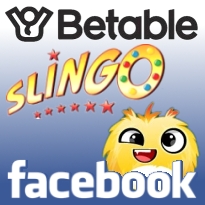 Following the August debut of its free-play casino app, Seattle-based Big Fish Games has followed through on its plans to offer UK players a real-money version of Big Fish Casino via the company’s partnership with Betable. The app, playable on iPhone, iPad and iPod devices, is the first real-money product to emerge via the Betable partnership but Big Fish is promising more is in the pipeline. In July, Betable unveiled its UK-based real-money gaming platform as an easy (20 lines of code) bolt-on back-end to handle licensing, payments, support and player-verification duties for social gaming outfits in all jurisdictions in which real-money play is permitted.
Following the August debut of its free-play casino app, Seattle-based Big Fish Games has followed through on its plans to offer UK players a real-money version of Big Fish Casino via the company’s partnership with Betable. The app, playable on iPhone, iPad and iPod devices, is the first real-money product to emerge via the Betable partnership but Big Fish is promising more is in the pipeline. In July, Betable unveiled its UK-based real-money gaming platform as an easy (20 lines of code) bolt-on back-end to handle licensing, payments, support and player-verification duties for social gaming outfits in all jurisdictions in which real-money play is permitted.
Betable has since added developers Slingo, Digital Chocolate and Murka Games to its roster of social gaming clients. Digital Chocolate released its SLOTS! social casino on Facebook in September, while Murka is looking to monetize its Slots Journey title. Slingo, which has been dropping hints for months about its foray into real-money play, licensed its free-play product to social gamers Zynga earlier this year. Zynga, meanwhile, recently signed a deal to offer real-money gaming in the UK via a tie-up with bwin.party digital entertainment. Betable CEO Chris Griffin called the social gaming crossover into real-money play “a tectonic change.” Griffin also took a veiled shot at the Zynga/bwin.party deal, saying “unlike recently announced IP licensing partnerships, Betable’s developers have the unique advantage of launching their own real-money games that they control.”
Gamesys’ Bingo & Slots Friendzy – the first real-money gaming product to debut on Facebook in the UK – has survived an attempt to curtail its promotional efforts. The UK’s Advertising Standards Authority (ASA) has dismissed two complaints that Gamesys’ use of “furry cartoon characters” (like the googly-eyed creature in the above image) to promote Bingo Friendzy were intended to appeal to children. The ASA acknowledged that children could find the ad appealing, but since Gamesys’ Facebook page restricted access to players 18 years or older, the ASA ruled that the company “had taken reasonable steps” to prevent underage players from even seeing the ad.
Stateside, Facebook has been hit with a federal antitrust complaint alleging the social network monopolizes the virtual-currency and payment-processing markets for social game companies. Courthouse News Service reports that the suit was brought by Austin, Texas-based Kickflip Inc., which offers virtual currency services under the Gambit brand. The target of Kickflip’s ire is Facebook’s stipulation that all social game developers that wish to host their product on Facebook must use the proprietary Credits payments system, from which Facebook takes a 30% cut of virtual goods sales. Kickflip alleges that Facebook “leveraged its dominance in the social game marketplace to control and dominate the separate market for virtual currency services” resulting in the destruction of a once “vibrant and competitive market,” including, not incidentally, Gambit’s own business. A Facebook spokesperson stated Kickflip’s complaint “is without merit.”
Facebook is also getting a hard look from European gaming regulators. At the recent European iGaming (EiG) conference in Barcelona, some regulators expressed concern that Facebook’s hosting of real-money online gaming effectively turned the social network into what Alderney Gambling Control Commission exec director André Wilsenach dubbed a ‘super affiliate’ that may require closer regulatory scrutiny. For now, most regulators appear content to wait and see if Facebook’s real-money gaming partners attempt to offer services in jurisdictions in which they lack the necessary licenses. But GamblingCompliance reported that the heads of Italy’s AAMS, Spain’s DGOJ and the Belgian Gaming Commission all stated they would be compelled to institute IP blocking of Facebook if it turned out citizens in their respective countries were using Facebook to gamble real money. The topic will undoubtedly come up for discussion at the upcoming Social Gambling Conference in London on Nov. 16.